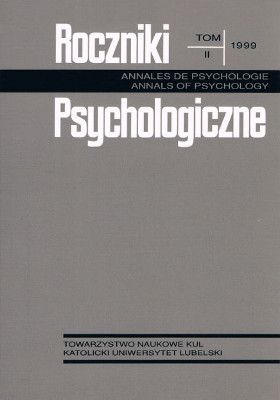Family and Labour within the System of Personal Meanings of Women who are Academics
Abstract
The paper is an empirical attempt to answer the question about the essence of possible difference between the personal meanings attributed to work and family by female academics. As a theoretical background H.J.M. Hermans's theory of valuation has been used. According to this theory, the subject organizes his or her experiences in a system of subjective meanings called valuations. They are always founded by two basic human motives (satisfied to a varied extent), i.e. a tendency to empower oneself (S) and a tendency to be united with others (O). The studies allow us to state that in the life of women who are academics, self-empowerment (S) distinctly dominates the experiences of a bond and being close (0). This results from the fact that the area of their job almost entirely satisfy the motive of self-development (S), and the family sphere, as the basic source of gratification of the communitarian motive (O) almost always allows for women to draw the sense of one's own value (S) from the experiences of contact and unity. It also turns out that although the family roles constitute for women the same are of self-realization , as the role of an academic, but to sacrifice professional affairs for family affairs do not arouse any conflict, which occurs in the reverse situation.
References
Drebing Ch. E., Gooden W. E., van de Kemp H., Malony H. N., Drebing S. M.(1995). The dream in midlife women: Its impact on mental health. International Journal of Aging and Human Development, 40, 73-87.
Erikson E. H. (1997). Dzieciństwo i społeczeństwo (tłum. z j. ang. P. Hejmej). Poznań: Dom Wydawniczy REBIS.
Hermans H. J. M. (1991). Self jako zorganizowany system wartościowań. W: A. Januszewski, Z. Uchnast, T. Witkowski (red.), Wykłady z psychologii w KUL, t. 5. Lublin: RW KUL, s. 387-409.
Hermans H. J. M., Hermans-Jansen E. (1995). Self – narratives psychology: construction of meaning in psychotherapy. New York: Guilford Press.
Hermans H. J. M., Kempen H. J. G. (1998). Moving cultures. The perilous problems of cultural dichotomies in globalizing society. Journal of American Psychologist, 53, 1111-1120.
Levinson D. J. (1986). A conception of adult development. American Psychologist, 41, 3-13.
Lieblich A. (1986). Successful career women at midlife: Crises and transitions. International Journal of Aging and Human Development, 23, 301-312.
Oleś P. (1992). Metoda Konfrontacji z Sobą Huberta J. M. Hermansa. Podręcznik. Warszawa: Pracownia Testów Psychologicznych Polskiego Towarzystwa Psychologicznego.
Oleś P. (1995). Kryzys „połowy życia” u mężczyzn. Psychologiczne badania empiryczne. Lublin: RW KUL.
Oleś P., Hermans H. J. M. (1995). The objective values from the personal valuation perspective during the changes in society. Journal for Mental Changes. Perspective of Economic, Political and Social Integration, 1, 113-122.
Oleś P. (1997). Dynamiczny self: Implikacje dla zjawiska autodestrukcji. W: P. Oleś (red.), Wybrane zagadnienia z psychologii osobowości. Lublin: TN KUL, s. 283-299.
Oleś P. (2000). Psychologia przełomu połowy życia. Lublin: TN KUL.
Pietrasiński Z. (1990). Rozwój człowieka dorosłego. Warszawa: Wiedza Powszechna.
Roberts P., Newton P.M. (1987). Levinsonian studies of women's adult development. Psychology and Aging, 2, 154-163.
Tokarska U. (1995). Konfrontacja z samym sobą w ujęciu D. J. Levinsona. W: A. Gałdowa (red.), Współczesne koncepcje osobowości. Kraków: Wydawnictwo UJ, s. 89-101.
Copyright (c) 1999 Roczniki Psychologiczne

This work is licensed under a Creative Commons Attribution-NonCommercial-NoDerivatives 4.0 International License.


